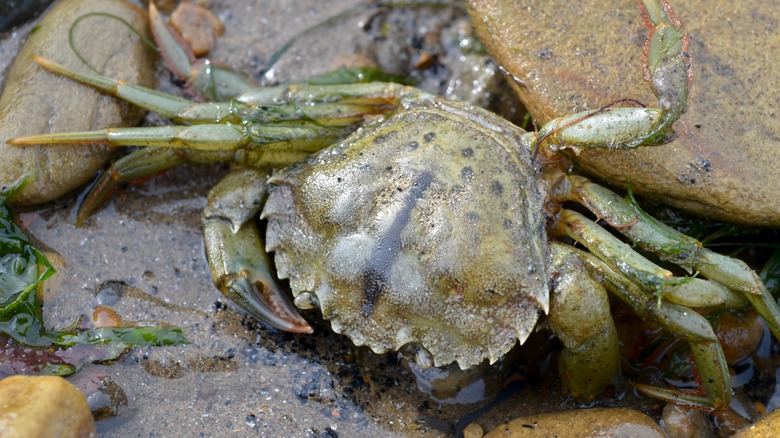A Seaside Discovery In Portugal Continues To Disprove A Key Theory About Homo Sapiens
Recent discoveries have changed long-standing assumptions about what Neanderthals were like, a modern human relative that went extinct some 40,00 years ago. Living across ancient Europe and in parts of Eurasia, Neanderthals were long described as primitive cave dwellers. Science now suggests they were much more sophisticated than once believed. At one time, a taste for certain types of foods available to early Homo sapiens was theorized as a possible explanation for modern human's turbo-charged brain power. As CNN reported in 2023, an archaeological dig in Portugal contradicts those notions and adds further evidence that Neanderthals, particularly in one aspect of their diet, were far more like us than once thought.
This research also overturns the idea that access to a specific kind of food might possibly explain advanced modern human cognition. The Neanderthal study was published in Frontiers in Environmental Archaeology, and according to the study author, Dr. Mariana Nabais, from the Catalan Institute of Human Paleoecology and Social Evolution in Spain (via CNN), "Our results add an extra nail to the coffin of the obsolete notion that Neanderthals were primitive cave dwellers who could barely scrape a living off scavenged big-game carcasses."
Seafood is brain food
Per The New York Times, access to seafood — filled with healthy omega-3 fatty acids — has long been thought to support a healthy brain and brain growth. As African populations of Homo sapiens explored the coast and developed a taste for all sorts of ocean-based delicacies, eating seafood might possibly explain how ancient Homo sapiens' intelligence evolved. Based on 2021 CNN reporting, though, further discoveries have shown that not only Homo sapiens along the coastline of Africa thousands of years ago were capable of complex human behaviors, but their relatives living inland around that same time were, too, with no known seafood in their diet.
Now, according to the Catalan Institute of Human Paleoecology and Social Evolution research, evidence suggests that Neanderthals living as far back as 106,000 to 86,000 years ago in a Portuguese oceanfront cave dined on seafood, and crabs specifically, among other kinds of shellfish. Additional research from the University of Barcelona, Spain, supports these findings, according to BBC News. University of Barcelona's research suggests Neanderthals not only ate shellfish but also sharks and dolphins.
'Forget about this Hollywood-like image of the Neanderthal'
According to the Frontiers in Environmental Archaeology study, in the oceanfront Portuguese cave during the Middle Paleolith age, evidence suggests that ancient Neanderthals not only ate plenty of seafood, but they also cooked some of it. Marks on the crab remains are consistent with how crab shells are opened and eaten by modern humans today rather than scavenged by some other predator. The crabs were cracked with stone tools rather than metal tools later developed. Signs point to those ancient Neanderthal fishermen catching their meal at low tide with some sense of what size crab would offer the most sustenance, much like how crabs are selected for food today.
According to the Portuguese findings, Neanderthals also ate mussels and clams. On these developments in our understanding of the Neanderthal way of life, João Zilhão from the University of Barcelona who uncovered evidence that Neanderthals ate sharks and dolphins told USA Today, "If this common consumption of marine resources played an important role in the development of cognitive skills, it did so on the entire humanity, including Neanderthals, and not only the African population that spread later." Via The Guardian, Zilhão added, "Forget about this Hollywood-like image of the Neanderthal as this half-naked primitive that roamed the steppe tundra of northern Europe hunting for mammoths and other megafauna with poor and inefficient weapons."


